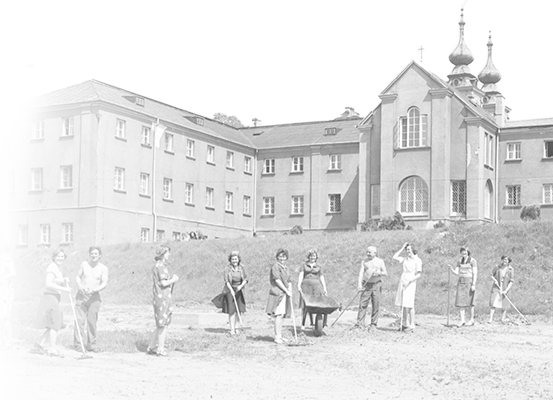Cardinal Stefan Wyszyński University in Warsaw was established in 1999, but its history began much earlier.
The predecessor of UKSW was the Academy of Catholic Theology (ATK) established by the decision of the government of the People’s Republic of Poland in August 1954, i.e. during the Polish Stalinist period, from two theological faculties – the University of Warsaw and the Jagiellonian University. The establishment of the state Academy of Catholic Theology was poorly received in the ecclesiastical environment, because according to canon law, theological faculties should be created or approved by the Holy See. As a result of the opposition of the professors of the Jagiellonian University, the local faculty remained in Kraków, limiting its activity to educating seminarians. On the other hand, professors of the Faculty of Theology at the University of Warsaw, whose traditions date back to 1816, started working in Warsaw’s Bielany, in buildings appropriated from Marian priests.
Primate Stefan Wyszyński the Grand Chancellor of the Academy
In 1960, the Holy See agreed to recognize the ATK. Primate Stefan Wyszyński, Archbishop of Warsaw, became the great chancellor of the Academy. However, full ecclesiastical rights were obtained by the Academy of Catholic Theology in 1989 and since then it has become both a state and church university.
Initially, ATK had three faculties: Theology, Canon Law and Christian Philosophy. But the state authorities were not interested in the development of the Academy. A very small number of students was allowed to study (numerus clausus). In 1954, 60 academic teachers educated only 415 students. It was not until the 1980s that their number increased. In 1987, the Faculty of Church History and Social Sciences was created from a part of the Faculty of Theology.
After the transformation of 1989, the University continued to develop. There were no restrictions on the number of students admitted, more lecturers were employed, and new fields of study were opened. In 1999, the Academy had four faculties and one institute of Family Studies with faculty rights, and nine fields of study (theology, canon law, law, philosophy, psychology, history, art history, political science, family studies). 295 academic teachers were employed and 8,787 students were educated.
Establishment of the University
The rapid development of the Academy of Catholic Theology in the 1990s raised hopes for its transformation into a university. On 3 September 1999, the Sejm of the Republic of Poland passed the Act establishing Cardinal Stefan Wyszyński University in Warsaw. It should be emphasized that it was not only the Primate Wyszyński University, but his university – the former Grand Chancellor of the ATK, who supported the development of the Academy from the 1960s.
On 1 October 1999, Cardinal Stefan Wyszyński University began operating as a state university with seven faculties: four ecclesiastical – Theology, Canon Law, Christian Philosophy and the Institute of Family Studies, as well as the Faculty of Humanities, the Faculty of Law and the Faculty of Historical and Social Sciences (transformed from the Faculty of Church History and Social Sciences). A year later, in 2000, the Faculty of Mathematics was established, which was soon transformed into the Faculty of Mathematics and Natural Sciences, the School of Science. In 2009, the Faculty of Biology and Environmental Sciences began operating, and in 2010, the Institute of Family Studies was transformed into the Faculty of Family Studies. Faculty of Medicine. Collegium Medicum, the youngest, and now dynamically developing faculty of the University, was established in 2018. A year later, the Faculty of Historical and Social Sciences was transformed into the Faculty of Social and Economic Sciences and the Faculty of Historical Sciences.
Campus construction
Until 1999, ATK owned a small building with an area of 3,000 m2 in the Bielany district. In Młociny, Warsaw, a small building with an area of 2,000 m2 was leased since 1992. The development of the University required the development of infrastructure. In 2003, Cardinal Józef Glemp, the metropolitan of Warsaw and the Great Chancellor of UKSW, donated to the university the land on which three buildings were built, today forming the Dewajtis campus.
The second campus at Wóycickiego 1/3 Street began to expand after 2001, when the Warszawa Bielany Metropolitan Office provided perpetual usufruct of the land in Młociny to Cardinal Stefan Wyszyński University. It is currently the largest scientific and didactic complex of UKSW. In 2008, the first part of the Center for Education and Interdisciplinary Research was opened here – the Auditorium Maximum including the Robert Schumann concert hall with 400 seats. In 2015, a modern Laboratory Center for Natural Sciences was launched, which has 50 laboratories. In 2022, the Faculty of Medicine. Collegium Medicum moved to a newly built modern building. The youngest, third, science and research campus is located in Dziekanów Leśny near Warsaw, where the UKSW Multidisciplinary Research Center was established.



